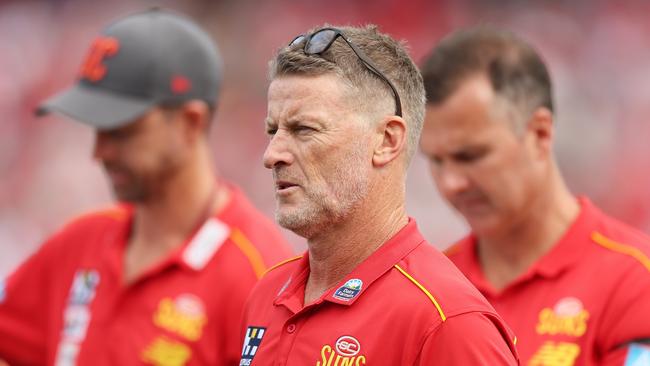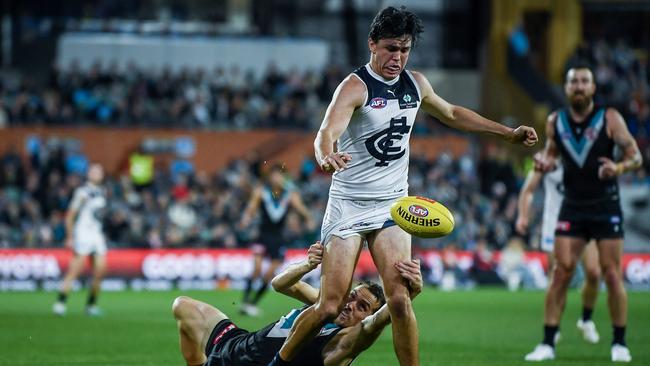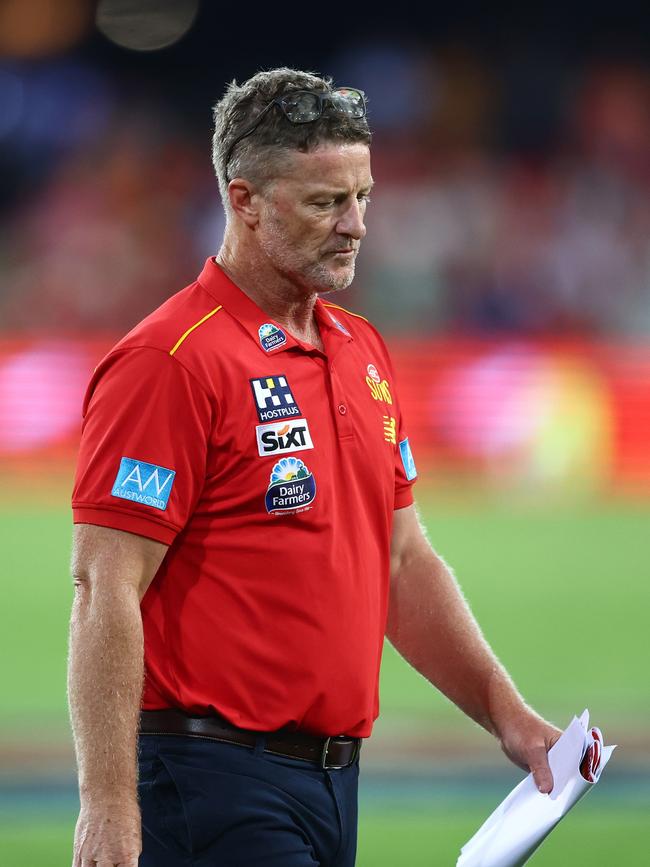Holding the ball has always been the most controversial of decisions and the new tackle rule has a lot of people scratching their heads | Graham Cornes
With a mid season rule change, holding the ball is now wrapped in confusion and the mess lies squarely at the AFL football department’s feet writes Graham Cornes.
Opinion
Don't miss out on the headlines from Opinion. Followed categories will be added to My News.
I love Australian rules football, I really do. It is the greatest game in the world, requiring levels of both aerobic and anaerobic fitness, strength, pace, hand/foot/eye co-ordination, skill to master the unpredictable reaction of an oval-shaped ball, and courage.
There may be athletes who can run further or faster or jump higher. Others may be stronger; some can throw a football further and others have foot-skills with a round ball that can mesmerise.
But none have the all-round capabilities of a professional Australian-rules footballer. It’s a fair bet however that no other sport changes its laws, or the interpretation of its laws, as often as the AFL does.
It might explain why it is so difficult to umpire – or so we are told. Every year some new modifications of the laws of the game are the introduced.

The ridiculous part of that is that some of these changes are introduced to rectify unforeseen problems caused by previous rule changes. They in turn create more problems. There is no better example than this year’s new interpretation of the ruck contests where the ruckmen are now allowed to fend-off their opponent with an arm before contesting the ball.
Ruck contests have never been more ugly, with the two giants wrestling and grappling for position - both holding, both infringing.
Occasionally a free kick is randomly given for which we, the spectator, has no idea. Allowing the third man up in the contest, as was allowed in the good old days, would solve that, and the many other problems of congestion plaguing the modern game. But that was another rule change.
The AFL outdid itself this week. Not content with the yearly raft of rule changes, it introduced new interpretations - in the middle of the season. What other sports do that?
Holding the ball has always been the most controversial of decisions that an umpire has to make, but never more so than this season where the umpires had seemingly taken it upon themselves to change the interpretation.
Regardless of how good the tackle had been the umpire was hesitant to award a free kick, electing instead to ball it up. Gold Coast coach, Damien Hardwick, called them out after his team’s recent loss to Carlton.
“There were 131 effective tackles today”, he said profoundly after the game, “and only four holding the ball free kicks paid.” He posited the statement as a warning about the player holding on to the ball getting hurt in a prolonged tackle, but we all know it was a criticism of the umpire for not blowing the whistle and awarding a free kick for holding the ball.
Whether it was Hardwick’s influence or the continual criticism from the football public that the holding the ball free kick had disappeared this season, the AFL’s football department acted.
“Thank you for your feedback re umpiring”, wrote Josh Mahoney, the general manager of football operations at the AFL.

It was a virtual confession that the umpires, or whoever was directing them had got it wrong. Accompanying the email to the clubs and the media was a video of five examples of players being legally tackled, having reasonable time and making a genuine attempt to dispose of the ball.
There was also an example where the player had no prior opportunity to dispose of the ball before he was tackled.
Pointedly, the video did not show any examples of the umpire getting the call horribly wrong – like when a player on the ground has the ball dragged under him and he is penalised for holding the ball.
But that’s an argument for another time. It is those three words: “no prior opportunity”, that create more frustration for footballers and spectators alike. Somehow, somewhere along football’s timeline, someone snuck them into football’s rule book.
It used to be simpler. Once a player was tackled, regardless of whether he had had prior opportunity to dispose of the ball he had to make an immediate attempt to dispose of the ball legally.

He was given a “reasonable time” to do so. If he didn’t, the free kick was awarded. If the ball was held to him in the tackle after his “genuine attempt” it was a ball up. One could sense Hardwick’s frustration. Great, legal tackles go unrewarded because the umpire says simply: “no prior opportunity”. Then he bounces it. Another stoppage.
Another stoppage. It’s the bane of the modern game. Another stoppage means more congestion.
The game has never been more congested. It’s tough in-and-under football, but the tackling techniques are so much better and the players are so much bigger and stronger that it’s hard to move the ball freely.
There is a rolling maul of constant stoppages and short kicks, until there is break into open space, Then the game becomes exciting and the skills exquisite (mostly).
The congestion of the modern game arrived with the increase in the number of interchange players and the overuse of the bench by coaches thinking that they had to get more players around the ball at more stoppages.
It’s not unusual to see all 36 players in the one half of an oval or even in one team’s forward-50 area. Go flat out for six or seven minutes, then go to the bench for a rest. Stop/start then start again.
And they wonder why there are so many soft tissue injuries in 2024.
Strangely, despite the pressure and the congestion, the high mark is still with us. The more adventurous of today’s modern footballers still climb into packs, onto the shoulders of opponents and teammates to thrill the crowd. The digital technology has it into the public arena before the match is finished.
What could the great sports photographers of yesteryear have done with today’s cameras, lenses and technology?
However, even the high mark could be a threatened spectacle? How many times is the opponent or the teammate who is the stepladder for the screamer, hit in the head, or the neck or the back?
It may sound ridiculous but Port Adelaide ruckman, Ivan Soldo, faced scrutiny for simply bending down with eyes on the ball to contest a ground ball. A 50/50 contest in which McGovern was bumped attracted the attention of the match review officer. That’s how petty this concept of duty of care has become in the AFL competition. The incident wasn’t even sighted and Soldo got off. Any contact with the head is blamed on the player who ultimately wins the ball. Ask GWS captain Toby Greene.
Despite the AFL intervention this week, it hard to know who to blame for the rising tide of dissatisfaction for the game and the way it is being umpired.
Having four umpires on the field hasn’t improved the game.
What is the fourth one doing and what he has added, other than confusion when a free kick is paid from a distance by the non-officiating umpire?
However, one thing is certain: changing the rules in the middle of the season does not inspire confidence in the system or pride in the game; and for that the AFL’s football department must accept full responsibility.






